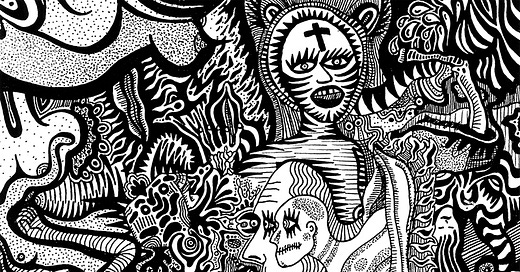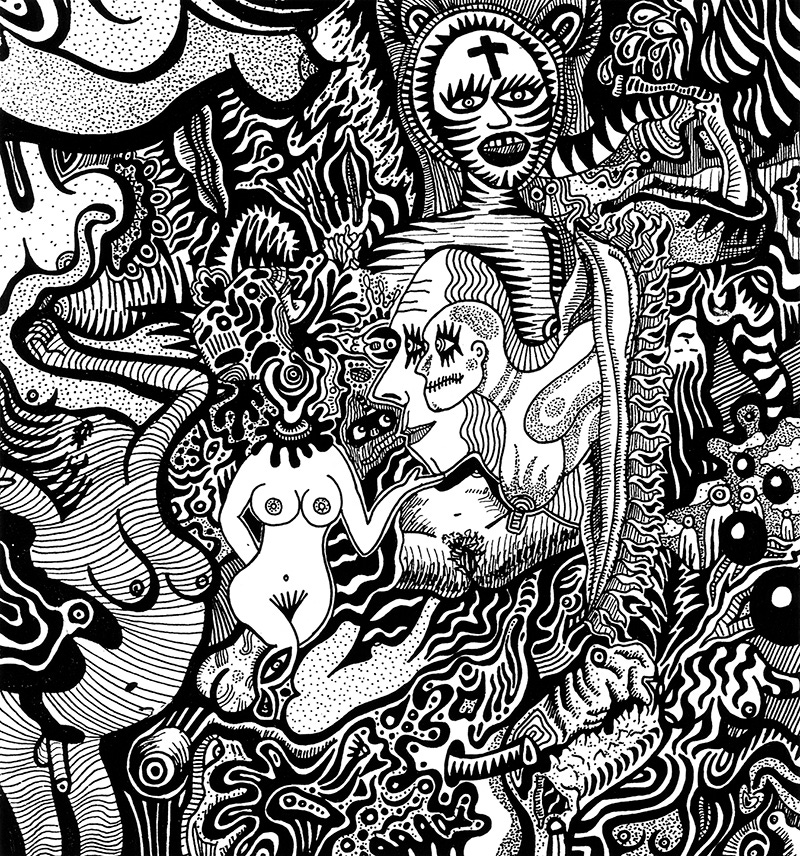Credit Card Morality
As published in Frankly Speaking: A Collection of Essays, Writings & Rants by Frank Moore. Excerpted from Cherotic Magic Revised by Frank Moore, July 1998.
Do to others as you would want to be done to you. Treat people as yourself. Love your neighbor, your enemy, others as yourself. You will reap what you sow. The law of karma. These are all nice abstractions with the loopholes of individualistic choice and time built into them. That is, they secretly imply that there is a choice about seeing the other as separate from yourself, from your personal body…imply that there is a karmic credit card on which you can in effect charge “wrong” action to be paid, with a certain rate of interest, in either good works or suffering at a later date. This creates a judging, an evaluating, a choosing, a questioning whether a “wrong” action is worth the charge on the credit card, how it affects your credit rating. Worst yet, it, like the bank’s Mastercard, tends to hide the real costs of the “wrong” actions, hiding it within the easy payment plan, hiding the wide-ranging resulting effects of the “wrong” actions.
“Wrong” actions are different both from mistakes and from “bad” action in a morality system. Mistakes are learning tools within life’s evolution. Mistakes are vital, unavoidable, and vulnerable because true mistakes are the result of creative risk-taking. A “mistake” that is repeated over and over is not a mistake at all, but a “wrong” action. A wrong action is an action which harms, does not promote life-affirmations…it is in fact a life-denial, broadcasting life-denials. Morality is an itemized list from the moral visa card…a list of all the possible sins and the form of payment required for each sin. But nowhere on this list is there any mention of the real results, both personal and dynamic, of the so-called sin.
This moral/karmic easy payment plan is one of the main means by which the life-denying power-combine abstracts us out of the direct involving experience of life. It puts the results outside of the personal present into an impersonal future. It puts the “payment” result of a sin outside of the personal present into both an impersonal past and impersonal future…that is, in a moral system of payment. You are paying for past sins in the future. This is fragmenting the reality of experience. A credit card makes it much harder to experience the reality of buying something because it fragments the exchange, the relationship, between two people. There is no exchange of what/who you are in the present. So it is very much harder to feel, experience, the real worth or result of the buying experience. It is much harder to feel, experience who you really are. So you spend more than you would if it had been a physical exchange, a physical relationship, between you and another person. Moreover, the medium of the exchange, money, has been abstracted into unreality, put outside the personal reality. This makes spending casually a matter of course. Creating this casualness is a main reason for credit cards, poker chips, and sins.
But the abstraction does not end at the purchase experience. Without the context of the relationship of exchange, the actual experience of the result of the exchange…for example, the concert which the ticket is for…takes on an unreality to it. Moreover, when it comes time to pay, the experience of the concert has long ago happened, faded into the past. The payment is no longer a personal physical involvement in the actual experience of the concert. The payment is now an involvement with the abstraction, the power system, of the credit card. This involvement with the abstraction is the concept of duty, “should” duty. Because the experience of the concert has been long ago made over into an abstraction before payment time, it is difficult to feel the real effect of the concert. So you dutifully, casually pay the credit card bill.
This basic credit card dynamic is at the root of all moral systems. All moral systems are systems of power, of abstraction, of fragmentation. A moral system contains a framework of shoulds, should nots, taboos. This moral framework is substituted for the direct experience of life. The reasons for the shoulds, should nots, and taboos are not revealed or explained. Love thy neighbor. Thou shall not kill. But there is not a real sense of why. This is true of the modern anti-moral systems of “going with the flow” and “do your own thing”…these anti-moral systems are just moral systems dressed up in mirrors. The should/taboo framework is a con for power.
A saint takes on a moral system so completely that he becomes the social system. Living within a moral framework as a saint does limits the personal ability to shape reality, hence transferring this ability in the form of power to the abstract social structure.
But a life of a saint is not the real goal of any moral system. If everybody lived as saints, the power that was thus generated would not be anywhere near enough to keep an abstract structure in existence. This is why real saints are always in a very tiny minority or a false myth. Saints are decoy models projected in front of people by the abstract power structure.
The real goal of any moral system is personal failure. This type of failure is different from the failure within evolution or creativity. It is the failure of a victim or a loser. A moral system is set up to be almost impossible, if not in fact impossible, for humans to live within. At the heart of the con of morality is to convince the people that they should do what they are not empowered to do. Convince them by creating a system of rewards and punishments which is based on the fragmentation of time into past and future. Once a person is plugged into this reward/punishment system, he stops shaping his actions by the concrete experience of the results, both linear and nonlinear, of his actions. Instead, he starts focusing on the rewards and punishments within the moral system…starts focusing on the past and/or future…starts doing/not doing based on the promised reward/punishment. This abstracts the person out of the direct present experience of his life action and its resulting effects. This abstraction is the root cause of personal casualness. Once he is thus abstracted out of the direct experience, he can be sold whatever prepackaged pictures of reality that the abstract power structures issue, will pay whatever price for forgiveness, protection, for a piece of power (no matter how small). In this way, the person is convinced by the power structure that he needs it, needs to belong to it, to conform to its prepackaged deck of pictures of reality.
Our modern social world is made up of the combine of moral systems. Each power system…be it political, religious, social, economical, or sexual…issues its own deck of reality pictures and moral credit cards. This moral combine includes power systems that we do not usually think of as moral systems. What I am thinking of are the systems of romance, glamour, and education. A moral system is a system that abstracts reality into mental pictures into the past/future.
Love others as yourself. Why? If you do, you will be rewarded sometime in the future. If you do, you will be paying back for something bad you did sometime in the past…or, for that matter, for something bad you will do in the future. This is the logic of morals. It is individualistic ego-centered. It abstracts your dynamic relationship with the other out of reality.
Deep love can be defined as: treat the other as yourself, love the other as yourself, because the other is in fact yourself, is part of your body. So what you do to/with/for the other, you are doing to yourself within the point of action of now. Deep love goes back to the pre-shamanistic personal awareness of the land, the plants and animals, the others in the tribe, and in fact the whole physical existence as parts of the personal body, and hence within personal responsibility.



